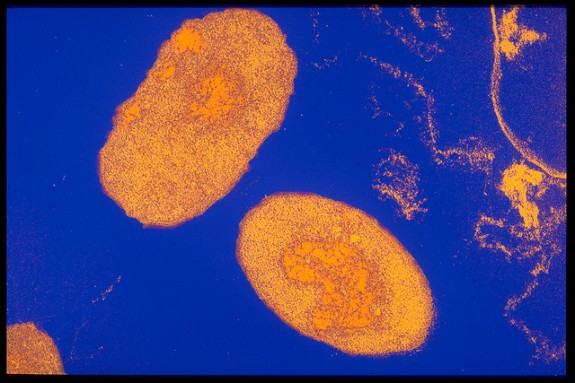Whooping Cough Is Making a Comeback, And This New Vaccine-Resistant Strain Won’t Help
Across the United States cases of whooping cough, or pertussis, are on the rise. Named for the “deep “whooping” sound [that] is often heard when the patient tries to take a breath,” says the U.S. National Library of Medicine, this bacterial infection can cause fever, difficulty breathing, and bouts of awful coughing that can last […]

Whooping cough, or pertussis, is caused by the bacterium Bordetella pertussis. Photo: Sanofi Pasteur
Across the United States cases of whooping cough, or pertussis, are on the rise. Named for the “deep “whooping” sound is often heard when the patient tries to take a breath,” says the U.S. National Library of Medicine, this bacterial infection can cause fever, difficulty breathing, and bouts of awful coughing that can last for weeks on end. According to the Centers for Disease Control and Prevention, whooping cough killed 18 people in the U.S. last year, casualties of the roughly 41,000 reported cases. For the U.S., 2012 was the worst outbreak of whooping cough in decades.
Some have laid blame on the surge in whooping cough cases on the decisions made by some parents to not vaccinate their children against the disease. The Associated Press says that another new development may also have contributed to last year’s record outbreak: the arrival of a vaccine-resistant strain of the Bordetella pertussis bacterium, the microbe that causes whooping cough, in the United States.
Health officials are looking into whether cases like the dozen found in Philadelphia might be one reason the nation just had its worst year for whooping cough in six decades.
The AP, reporting on a letter published today in the New England Journal of Medicine, says that similar bacteria were previously found in Japan, France and Finland, but that 12 cases of whooping cough in children treated at a hospital in Philadephia were the first instances of a vaccine-resistant strain appearing in the U.S.
The new study suggests that the new whooping cough strain may be why more people have been getting sick. Experts don’t think it’s more deadly, but the shots may not work as well against it.
According to the researchers who analyzed the new bacteria, more work will be needed to see if the Philadelphia cases were an isolated event or part of a wider-spread shift in the whooping-cough-causing bacteria across the United States.
More from Smithsonian.com:
The Black Death Never Left – And It Might Defeat Our Best Defenses
A Conservative Estimate For Dengue Fever Infections in India: 37 Million Each Year
/https://tf-cmsv2-smithsonianmag-media.s3.amazonaws.com/accounts/headshot/smartnews-colin-schultz-240.jpg)
/https://tf-cmsv2-smithsonianmag-media.s3.amazonaws.com/accounts/headshot/smartnews-colin-schultz-240.jpg)